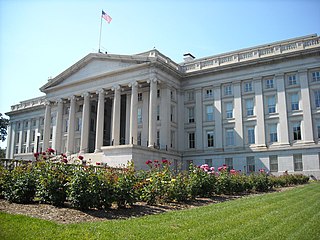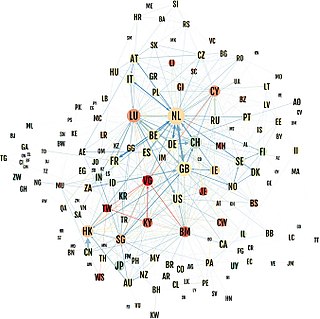
The economy of Monaco is reliant on tourism and banking. Monaco, situated on the French coast of the Mediterranean Sea, is a popular resort, attracting tourists to its casino and pleasant climate.

An offshore bank is a bank that is operated and regulated under international banking license, which usually prohibits the bank from establishing any business activities in the jurisdiction of establishment. Due to less regulation and transparency, accounts with offshore banks were often used to hide undeclared income. Since the 1980s, jurisdictions that provide financial services to nonresidents on a big scale can be referred to as offshore financial centres. OFCs often also levy little or no corporation tax and/or personal income and high direct taxes such as duty, making the cost of living high.
Tax avoidance is the legal usage of the tax regime in a single territory to one's own advantage to reduce the amount of tax that is payable by means that are within the law. A tax shelter is one type of tax avoidance, and tax havens are jurisdictions that facilitate reduced taxes. Tax avoidance should not be confused with tax evasion, which is illegal. Both tax evasion and tax avoidance can be viewed as forms of tax noncompliance, as they describe a range of activities that intend to subvert a state's tax system.

A shell corporation is a company or corporation with no significant assets or operations often formed to obtain financing before beginning business. Shell companies were primarily vehicles for lawfully hiding the identity of their beneficial owners, and this is still the defining feature of shell companies due to the loopholes in the global corporate transparency initiatives. It may hold passive investments or be the registered owner of assets, such as intellectual property, or ships. Shell companies may be registered to the address of a company that provides a service setting up shell companies, and which may act as the agent for receipt of legal correspondence. The company may serve as a vehicle for business transactions without itself having any significant assets or operations.
A tax exile is a person who leaves a country to avoid the payment of income tax or other taxes. The term refers to an individual who already owes money to the tax authorities or wishes to avoid being liable in the future for taxation at what they consider high tax rates, instead choosing to reside in a foreign country or jurisdiction which has no taxes or lower tax rates.
Offshore investment is the keeping of money in a jurisdiction other than one's country of residence. Offshore jurisdictions are used to pay less tax in many countries by large and small-scale investors. Poorly regulated offshore domiciles have served historically as havens for tax evasion, money laundering, or to conceal or protect illegally acquired money from law enforcement in the investor's country. However, the modern, well-regulated offshore centres allow legitimate investors to take advantage of higher rates of return or lower rates of tax on that return offered by operating via such domiciles. The advantage to offshore investment is that such operations are both legal and less costly than those offered in the investor's country—or "onshore".
International taxation is the study or determination of tax on a person or business subject to the tax laws of different countries, or the international aspects of an individual country's tax laws as the case may be. Governments usually limit the scope of their income taxation in some manner territorially or provide for offsets to taxation relating to extraterritorial income. The manner of limitation generally takes the form of a territorial, residence-based, or exclusionary system. Some governments have attempted to mitigate the differing limitations of each of these three broad systems by enacting a hybrid system with characteristics of two or more.
The European Union withholding tax is the common name for a withholding tax which is deducted from interest earned by European Union residents on their investments made in another member state, by the state in which the investment is held. The European Union itself has no taxation powers, so the name is strictly a misnomer. The aim of the tax is to ensure that citizens of one member state do not evade taxation by depositing funds outside the jurisdiction of residence and so distort the single market. The tax is withheld at source and passed on to the EU Country of residence. All but three member states disclose the recipient of the interest concerned. Most EU states already apply a withholding tax to savings and investment income earned by their nationals on deposits and investments in their own states. The Directive seeks to bring inter-state income into the same arrangement, under the Single Market policy.
A tax haven is a term, often used pejoratively, to describe a place with very low tax rates for non-domiciled investors, even if the official rates may be higher.

An offshore financial centre (OFC) is defined as a "country or jurisdiction that provides financial services to nonresidents on a scale that is incommensurate with the size and the financing of its domestic economy."
The Common Reporting Standard (CRS) is an information standard for the Automatic Exchange Of Information (AEOI) regarding financial accounts on a global level, between tax authorities, which the Organisation for Economic Co-operation and Development (OECD) developed in 2014.

Base erosion and profit shifting (BEPS) refers to corporate tax planning strategies used by multinationals to "shift" profits from higher-tax jurisdictions to lower-tax jurisdictions or no-tax locations where there is little or no economic activity, thus "eroding" the "tax-base" of the higher-tax jurisdictions using deductible payments such as interest or royalties. For the government, the tax base is a company's income or profit. Tax is levied as a percentage on this income/profit. When that income / profit is transferred to a tax haven, the tax base is eroded and the company does not pay taxes to the country that is generating the income. As a result, tax revenues are reduced and the country is disadvantaged. The Organisation for Economic Co-operation and Development (OECD) define BEPS strategies as "exploiting gaps and mismatches in tax rules". While some of the tactics are illegal, the majority are not. Because businesses that operate across borders can utilize BEPS to obtain a competitive edge over domestic businesses, it affects the righteousness and integrity of tax systems. Furthermore, it lessens deliberate compliance, when taxpayers notice multinationals legally avoiding corporate income taxes. Because developing nations rely more heavily on corporate income tax, they are disproportionately affected by BEPS.

Adam Aristotle Starchild, born Malcolm Willis McConahy, was a financial consultant, convicted fraudster, key figure in the "perpetual traveler" movement, and prolific author of books relating to investment, taxation, and the "offshore" world.

Robert C. Beckman was an American investment adviser, commentator, and author, who achieved fame in the United Kingdom in the 1980s through his media appearances and his books The Downwave (1983) and Into the Upwave (1988). As a young man he made, and quickly lost, a fortune on the stock market. The experience permanently disillusioned him with equity investment and he became known for his forecasts of doom for the stock market and British house prices which were largely proved wrong.
The Republic of Panama is one of the oldest and best-known tax havens in the Caribbean, as well as one of the most established in the region. Panama has had a reputation for tax avoidance since the early 20th century, and Panama has been cited repeatedly in recent years as a jurisdiction which does not cooperate with international tax transparency initiatives.

Gabriel Zucman is a French economist who is currently an associate professor of public policy and economics at the University of California, Berkeley‘s Goldman School of Public Policy, Chaired Professor at the Paris School of Economics, and Director of the EU Tax Observatory.
Harry Donald Schultz was an American investment adviser and author who published The International Harry Schultz Letter for 45 years. He learned to trade while serving in the United States Army in Shanghai and on his return to the US bought and sold small newspapers, 13 in all. He spent the rest of his career advising on investments and writing books and his eponymous newsletter. Schultz was closely associated with libertarian causes.
International tax planning also known as international tax structures or expanded worldwide planning (EWP), is an element of international taxation created to implement directives from several tax authorities following the 2008 worldwide recession.

Conduit OFC and sink OFC is an empirical quantitative method of classifying corporate tax havens, offshore financial centres (OFCs) and tax havens.

Ireland has been labelled as a tax haven or corporate tax haven in multiple financial reports, an allegation which the state has rejected in response. Ireland is on all academic "tax haven lists", including the § Leaders in tax haven research, and tax NGOs. Ireland does not meet the 1998 OECD definition of a tax haven, but no OECD member, including Switzerland, ever met this definition; only Trinidad & Tobago met it in 2017. Similarly, no EU–28 country is amongst the 64 listed in the 2017 EU tax haven blacklist and greylist. In September 2016, Brazil became the first G20 country to "blacklist" Ireland as a tax haven.










